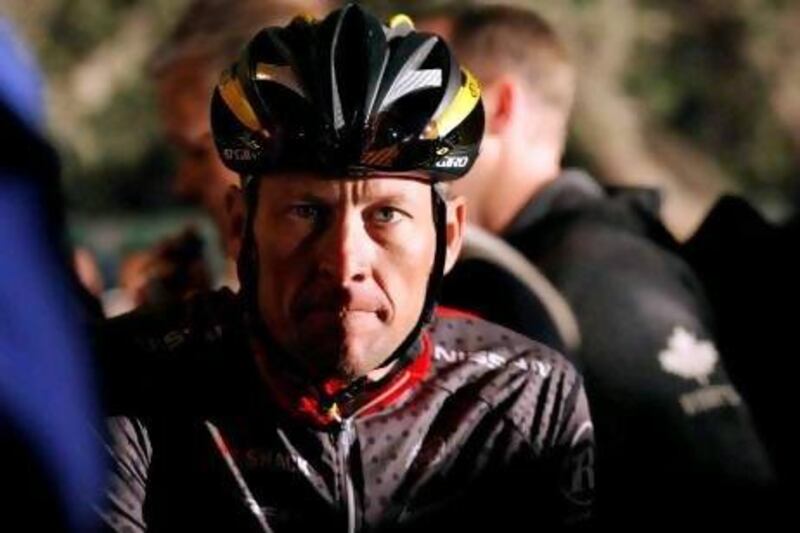I have just heard a radio news bulletin describe the US Anti-Doping Agency's damning report into disgraced cyclist Lance Armstrong as a "bombshell for cycling".
Well, not exactly. The most effective bombs go off suddenly and without warning. Their shock value is very much their raison d'être.
The bringing down of Armstrong has been more like one of those controlled explosions used to demolish a condemned block of flats. Local residents - by which I mean cycling aficionados - have seen it coming for years. They heard the whispers, watched the perimeter fencing go up, saw the charges laid, witnessed the last few loyal residents give up the fight and scurry to safety.
Publication of the USADA report was merely the grand finale to a long process, the day when the rest of town - by which I mean casual cycling fans, general sport nuts and assorted rubberneckers - turned out to watch the mayor sink the plunger, detonate the charge and watch the ugly, toxic, blot-on-the-landscape come tumbling down.
Spectacular? Yes. Shocking? Not in the slightest.
Armstrong's journey from icon to eyesore began years ago. One does not win seven consecutive Tours de France without a few eyebrows being raised - although, without firm evidence, such gossip was rightly dismissed.
Harder to ignore was Frankie Andreu, a US Postal Service rider from Armstrong's pre-cancer days, who told a court in 2006 that Armstrong doped and intimidated teammates into silence.
Or Stephen Swart, a former Motorola teammate of Armstrong, who in 2006 claimed they had both doped during the 1995 Tour de France.
Then there was Tyler Hamilton, another US Postal teammate who gave damning evidence to a Grand Jury in 2010 before specifically accusing Armstrong of doping on the American television show 60 Minutes in 2011.
Around the same period, Floyd Landis was blowing this whistle more often than a police dog handler.
There are only so many guys that can be written off as delusional, bitter or attention seeking. The writing has been on the wall for years, coming into ever sharper focus.
As for Armstrong's increasingly theatrical denials, big on hyperbole and low on fact, they only served to make him look more guilty.
Even this week, his lawyer tried to pre-empt the USADA report by accusing the body of a "taxpayer-funded witch hunt". A waste of tax dollars? Was that really the best they could do? The sound of a barrel-scraping was deafening.
Incredibly, the fact that Armstrong has stunk so badly for so long may not be entirely bad news for cycling.
Yes, the Union Cycliste Internationale emerges with no credit: at best it was wilfully naive about doping, at worst it was complicit. It has some serious questions to answer, not least why the honorary president Hein Verbruggen was vigorously defending Armstrong even as recently as last year.
However the fact remains that cycling has continued to flourish as a sport, despite the obvious stench around Armstrong. The diehard fans will not desert the sport. They know that fallen heroes are an occupational hazard, that cycling champions' names are not so much etched into history as chalked on to a blackboard, pending the test of time.
As for the fair-weather fans, including the millions first attracted to cycling by the incredible Lance Armstrong brand (which was always about more than mere sport), perhaps a few have drifted away in disgust. Perhaps a few more will follow.
I suspect, however, that many will stick around, if only to see what fills the vacuum left by Armstrong, to see what brave new world will emerge from the wreckage of his demolition.
Certainly in the UK, where the cycle boom is at it loudest, it will take more than one disgraced American to diminish the fervour for Bradley Wiggins, Mark Cavendish et al.
Team Sky remains avowedly antidoping and appears to have survived the Armstrong blast relatively unscathed - although it is undeniably embarrassing that Michael Barry, a founder Team Sky rider, has now confessed to doping during his time at US Postal.
But, hey, you cannot blow up the building next door and not expect a little dust on your washing.
Cycling is not finished by the long-anticipated demolition of the Armstrong carbuncle - but it must work hard to clear the rubble and ensure that whatever takes its place has deeper foundations and a more attractive facade.
As for Armstrong, he should stick to his admirable charity work as a beacon of hope to cancer sufferers. If nothing else, his tarnished story may provide renewed hope in the miraculous power of modern pharmaceuticals.
The "most sophisicated doping programme", a7





